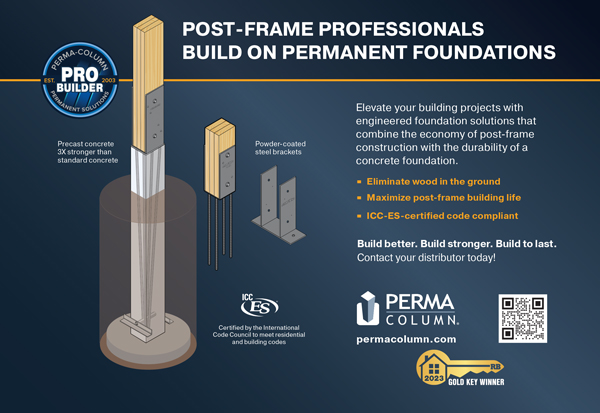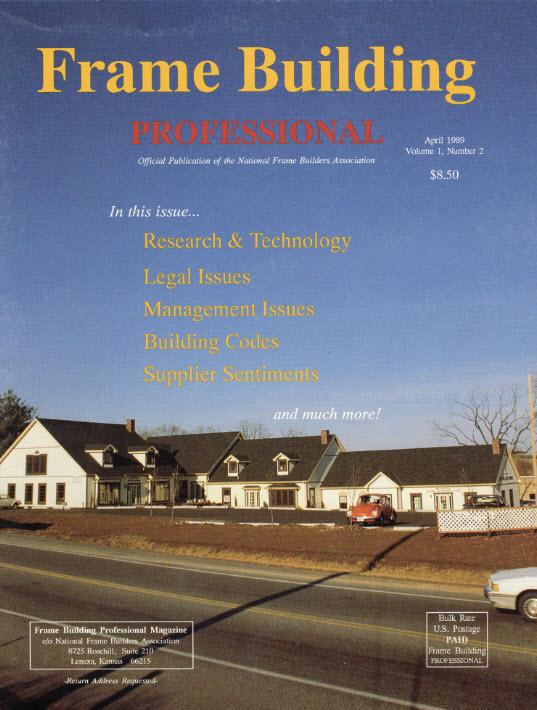Win repeat business and referrals with professional communication
By ABC Supply
From your first interaction with a client to your last, it’s important to provide a positive customer service experience. Doing so will not only ensure that your project runs as smoothly as possible, but it can also lead to great reviews about your business and referrals for future projects.
Follow these tips for providing exceptional customer service, beginning with your sales presentation, and for continuing to build a positive relationship once you win the job.
Win Over New Customers With a Professional Sales Presentation
1. Dress Professionally: It’s important to dress for success and put your best foot forward when you’re heading into a sales presentation meeting—even a virtual one. Wear clean, professional attire. Purchase customized apparel, logos, and stationery to help you project a professional image and show that you operate a business your client can rely on to deliver quality work. ABC Supply offers all of these professional image resources and more through its Freedom Programs.
2. Listen to Your Prospects’ Requests: Actively listen to prospective customers to really understand what they want so that you can create a detailed sales presentation that addresses all of their project requirements. It sounds simple, but if you miss the mark in your presentation, prospective customers will feel like you’ve wasted their time.
Once you’ve covered what the prospect is looking for, then you can consider sharing additional ideas or opportunities that they might not be thinking about. Is there a more sustainable solution for the look the client wants? Do you offer additional services that the customer might not be asking about that may be needed in the future? By addressing their primary must-haves and including bonus ideas, you’ll demonstrate your ability to listen and exceed their expectations.
3. Plan for Visuals and Samples: The projects you’re pitching often come with big price tags and are viewed as long-term investments, so it’s important to make customers feel good about moving forward with you and the project.
Visuals can be a great way to sell your capabilities and get people excited. Consider including visual renderings of the property, before and after shots of similar projects, or even bringing product samples. ABC Supply offers Pictureit, a tool that lets you virtually design a home’s exterior, to help your prospect “try on” products and see what the end result will be.
4. Include Testimonials: One of the most powerful ways to prove you can do the job is to share examples of success stories from your other satisfied customers. After you finish a job, ask them the following questions and see if they’d be comfortable with you sharing their review with prospects:
- Why did you choose our business?
- Were you satisfied with the work? Why or why not?
- How would you describe what it’s like to work with my team?
- Was my team responsive and accommodating?
Incorporate the positive reviews in presentations where you’re pitching similar types of jobs.
5. Provide Financing Options: When you’re pitching a job, your prospective client may have concerns about how they can pay for the project. Consider including financing options in your sales presentations to make it easy for your customers to understand what resources are available to them to finance their residential or commercial projects.
ABC Supply offers in-home financing with GreenSky® through its Freedom Programs. It’s a win-win service that helps you grow your business by making a project more affordable for your client.
6. Establish Next Steps at the End of the Sales Presentation: Make sure everyone is clear on what needs to happen after the meeting ends and when you’ll follow up. Do you owe the customer more information? Do they know when they’re hoping to make a decision? Instead of saying, “I’ll get back to you next week,” let them know the specific date and time that you’ll plan to circle back with answers to any lingering questions.
Continue Providing Great Customer Service by Professionally Navigating the Project
1. Be Clear on What You’re Agreeing To: Congratulations! You’ve won the job. When discussing your contract, it’s important that you and the customer(s) are clear on what you’re agreeing to do. This will help guide conversations in the future, should questions about additional work that is out of scope come up. To prevent difficult questions about costs later in a project, take time to walk through your scope of work before a job begins.
2. Reinforce Your Professional Experience: There are a lot of “experts” your customers may reference when asking you questions. If your customer asks why you’re doing something one way when they saw it done another way in an article or on a show, be sure to sell the expertise you have in the industry. For example, “There are a few different ways you can approach this type of work. Based on my professional experience and these XYZ factors, my opinion is to…”
3. Take Time to Inform Your Customers: Can you get the project done faster? Why do you recommend one product over another? Can you do it cheaper? Your clients will likely have lots of questions throughout the course of a project, so it’s important that you’re patient with them and take time to explain the reasoning behind your actions. It can also be helpful to walk your customers through your time line, so they understand all the steps that need to happen.
4. Turn Extra Client Requests Into Business Opportunities: If your customers start making requests that are outside your scope of work, you or your crew may feel pressured to say “yes” without discussing additional charges. But as you know, time is money, so don’t get in the habit of giving away work for free.
Instead, train yourself and your team to respond to these customer requests in a way that shows you’re accommodating but won’t perform the favor for free. For example, “Yes, we’re happy to take care of that while we’re here. I can provide you with an estimate for the work right away.”
If the extra work will take your team off of their original time line, be clear about that up front and be careful not to spread yourself and your crew too thin: “Because it’ll take a few hours for us to complete that, we’re not going to get through everything we planned for today. It may push the completion date of your project back a little bit. Are you OK with the added cost and a later project completion date?”
With clear and up-front communication and good customer service from the sales pitch through to the completion of the job, you can maintain a great relationship with your client.
Visit www.abcsupply.com/blog for more tips on providing great customer service. FBN























